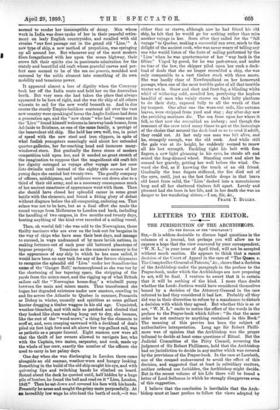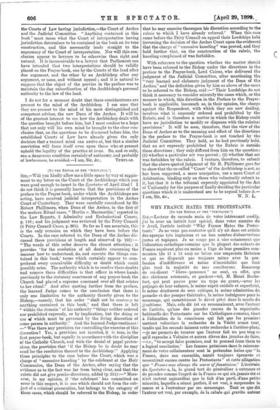LETTERS TO THE EDITOR.
THE JURISDICTION OF IRE ARCHBISHOPS.
[TO THE EDITOR OP THE "SPECTATOR."]
is seldom desirable to discuss legal questions in the columns of a journal, but perhaps you will allow me to express a hope that the view conveyed by your correspondent; "W. N. L.," in your issue of April 22nd, will not be accepted without much caution. He appears to think that a recent decision of the Court of Appeal in the case of "The Queen v. The Comptroller-General of Patents," &c., shows that a decision of the Archbishop under the paragraph in the preface to the Prayer-book, under which the Archbishops are now proposing to act, will be final. I venture to assert that it is certain that it will be nothing of the kind. I more than doubt whether the Lords Justices would have considered themselves bound by a decision of the Attorney-General in the case referred to had they considered it bad law. Probably all they did was in their discretion to refuse by a mandamus to disturb a decision with which they agreed. But whether this is so or not, "W. N. L." omits to notice the effect of the words in the preface to the Prayer-book which follow: "So that the same order be not contrary to anything contained in this Book." The meaning of this proviso has been the subject of authoritative interpretation. Long ago Sir Robert Philli- more was of opinion that the Archbishop was the proper tribunal to decide at least some questions of Ritual. But the Judicial Committee of the Privy Council, reversing the judgment of Sir Robert Phillimore, held that the Archbishop had no jurisdiction to decide in any matter which was Covered by the provisions of the Prayer-book. In the case at Lambeth, one of the counsel endeavoured to avoid the effect Of this decision, and suggested that at least in subsidiary matters, neither ordered nor forbidden, the Archbishop-might decide. But in the recent volume of his Life there will be found a letter of Lord Selborne in which he strongly disapprbves even of this suggestion. - I believe that the conclusion is inevitable that the Arch- bishop must at least profess to follow the views adopted by the Courts of Law having jurisdiction,—the Court of Arches and the Judicial Committee. "Anything contained in this book" must mean what the Court of interpretation having jurisdiction determines to be contained in the book on its true construction, and this necessarily leads straight to the supremacy of the Court of interpretation. Nor will this con- clusion appear to lawyers to be otherwise than right and natural. It is inconceivable to a lawyer that Parliament can have intended that two interpretations should be validly placed on the Prayer-book, one by the Courts of the land after due argument, and the other by an Archbishop after any argument, or none, and without appeal ; and it is natural to suppose that the object of the proviso in the preface was to maintain the due subordination of the Archbishop's personal authority to the law of the land.
I do not for a moment doubt that these considerations are present to the mind of the Archbishop. I am sure that they are present to the mind of his most distinguished and competent adviser, the new Dean of the Arches. It will be of the greatest interest to see how the Archbishop deals with the question brought before him, but I must confess to a hope that not only will his own mind be brought to the clear con- clusion that, on the questions to be discussed before him, the established Courts of Law have already given the only decision that a trained mind can arrive at, but that a similar conviction will force itself even upon those who at present uphold the legality of the practice at issue. So, and so only, can a dangerous condition certainly of antinomy, and probably of lawlessness, be avoided.—I am, Sir, ttc., TE3.1PLAR.























































 Previous page
Previous page